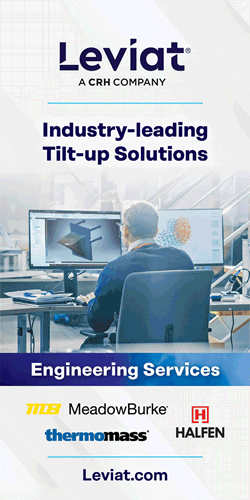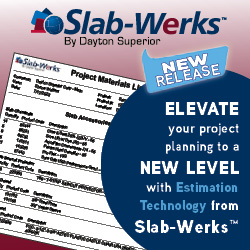Meet Your President
By: Wendy Ward, Constructive Communication, Inc.
The TCA would like to take this opportunity to introduce you to our president for 2005, Al Engelman of Engelman Construction. As the president of a growing construction firm, Engelman has decades of construction industry experience and knows first-hand what it takes to not only survive, but also create a successful company. He is a registered professional engineer and fellow of the American Concrete Institute (ACI). This experience will certainly aid Engelman as he leads the efforts of the growing site cast tilt-up industry.
Located in Macungie, Pa., Engelman Construction has been a member of the industry since 1974. Central to their approach is the ability to combine strong project management skills and modern technology with the best craftsman available. Engelman Construction completes an average of 100 decorative concrete projects each year, as well as approximately 65 other projects including warehouses ranging in size from 100,000 to 1,000,000 square foot.
Engelman assumed the role of TCA president at the Association’s Annual Meeting in January. However, this is not his first time as an industry association president as Engelman also served as president of the American Society of Concrete Contractors (ASCC) from 2001– 2002. Read on to learn about Engelman’s thoughts on the factors affecting today’s industry and how to suc- ceed in today’s construction market.
Q. How long have you been a member of the construction industry?
A. For more than 46 years. I graduated from the University of Detroit in 1958 with a degree in engineering. I founded Engelman Construction in 1974 and have continually diversified our firm’s offerings based on our client’s changing needs. For example, we began our precast operation in 1980.
Q. What services does your firm provide?
A. Our firm provides a wide variety of services including tilt-up, decorative concrete, retaining walls, site work, precast products, foundations, slabs, and super- flat floors. We have completed residential, municipal and state projects. For the commercial industry, we have completed warehouse and industrial/manufacturing facilities, including sewage treatment plants.
Q. What do you think has been the biggest change in the construction industry?
A. I have seen several evolutions in the construction industry during the past 46 years. Currently, more projects are moving away from being managed by a general contractor and instead are run by construction managers. Further, design-build is becoming commonplace, when just a few years ago, it was still seen as in its infancy.
Q. What are the biggest challenges plaguing the industry today?
A. Human relations are a constant challenge in the construction industry. In recent years, it has become increasingly difficult to find qualified project managers. It does not seem that project managers are trained as well as they were in the past. Another challenge is the litigious direction our industry is taking. Contract language is adding more risk for the subcontractor, which makes it critical for us to carefully evaluate the terms of each project.
Q. What suggestions do you have for alleviating these challenges?
A. I think it is crucial that concrete subcontractors get involved in the prebid process to eliminate some of the challenges that occur during projects. By involving concrete subcontractor early, we could provide our insight and experience to more accurately develop schedules and provide realistic cost estimates. Our knowledge of new technologies and equipment should be considered to provide owners with a cost and materials savings. I believe that is hard to change processes and estimates if we are not involved in the earliest stage of a project. Further, subcontractors should be included in preconstruction and pre- pour meetings. We need to encourage attendance by members of all trades to ensure that everyone is aware of their responsibilities. Too often, attendance at these meetings is low, because individuals assume that someone else will attend and let them know what they need to do. We need to work to end these assumptions to create a smoother project and increase safety.
Q. What is the most challenging aspect of running a business in this industry?
A. As a business owner, human resources and safety are the most challenging tasks. Too many people do not have the skills necessary for completing good work. It is important to have properly trained employees to ensure that a jobsite is as safe as possible. Another challenge is the low-bid mentality that currently exists in the marketplace. In the past, your firm was measured on the quality of work that you provided, not just simply the fact that you were the lowest bidder. Further, it is often the contractor’s duty to uncover differences between the structural and architectural drawings. We need all trades to work together to end these blueprint and specification contradictions. This will also help eliminate scheduling difficulties that arise when too many trades are working on a job at the same time.
Q. How do you ensure that your firm maintains dedicated employees?
A. We are a family-owned business and are committed to providing personal contact with all our employees. We understand the importance of human relations on every job, every day. We conduct daily meetings, including Toolbox Talks and huddles to dis- cuss the goals for the day. Communication is extremely important in our firm and








